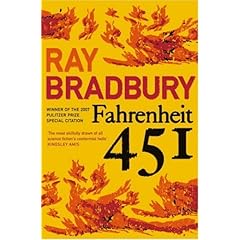 --The blurb--
--The blurb--"In Fahrenheit 451, Ray Bradbury's classic, frightening vision of the future, firemen don't put out fires--they start them in order to burn books. Bradbury's vividly painted society holds up the appearance of happiness as the highest goal--a place where trivial information is good, and knowledge and ideas are bad. Fire Captain Beatty explains it this way, "Give the people contests they win by remembering the words to more popular songs.... Don't give them slippery stuff like philosophy or sociology to tie things up with. That way lies melancholy."
Guy Montag is a book-burning fireman undergoing a crisis of faith. His wife spends all day with her television "family", imploring Montag to work harder so that they can afford a fourth TV wall. Their dull, empty life sharply contrasts with that of his next-door neighbour Clarisse, a young girl thrilled by the ideas in books, and more interested in what she can see in the world around her than in the mindless chatter of the tube. When Clarisse disappears mysteriously, Montag is moved to make some changes, and starts hiding books in his home. Eventually, his wife turns him in, and he must answer the call to burn his secret cache of books. After fleeing to avoid arrest, Montag winds up joining an outlaw band of scholars who keep the contents of books in their heads, waiting for the time society will once again need the wisdom of literature."
--The review--
The canon of dystopian novels is generally distilled in the public consciousness to three novels: George Orwell's 1984, Aldous Huxley's Brave New World, and Margaret Atwood's The Handmaid's Tale. However, there are many worthy others, including the works of HG Wells, and Fahrenheit 451 by Ray Bradbury. Centring on the theme of book burning (a subject familiar to any British history student born after about 1980 due to the prevalence of Nazi Germany in the syllabus), Bradbury takes the image further with a series of what-ifs, making soap operas more interactive and scary, and magnifying the populace that is already constantly plugged into MP3 players by extending this to include it as their source of news as well.
Scarily, the novel was written only in 1953, before the mass paranoia created by the red scare had taken full force, and before MP3 players had even been invented. It is this relevance and sense of prophecy, as with other dystopian novels, that ensures enduring success. Bradbury's style creeps up on you and intensifies as you read, making this a real page-turner. Even the characters that you only meet fleetingly have vivid personalities, meaning that the novel's cast is printed almost indelibly on the reader's consciousness. The plot is tightly sustained and remains accessible while still maintaining some details of complexity, making it not only a book that you'll race to finish, but a book that you want to return to as well. Haunting and enjoyable, and yet imbued with humanity, this is a readable and thought-provoking introduction to Ray Bradbury's work that deserves to be included more ostensibly in the list of must-read dystopian literature.
Other works by Ray Bradbury
The Martian Chronicles (1950)
Dandelion Wine (1957)
Something Wicked This Way Comes (1962)
The Halloween Tree (1972)
Death is a Lonely Business (1985)
A Graveyard for Lunatics (1990)
Green Shadows, White Whale (1992)
From the Dust Returned (2001)
Let's All Kill Constance (2004)
Farewell Summer (2006)





No comments:
Post a Comment